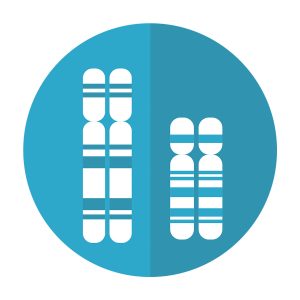Modern day medicine and the rapid advances in genomics make it easier for us to understand how our genes are affecting our bodies and our health. This ability to get a deeper understanding of our genes has proven to be a blessing in disguise time and time again. It has allowed people to proactively beat cancer, lose weight with tailored fitness plans, and predict disease in order to prevent it. But could there be a downside to knowing so much about our genes?
Imagine you were to go through genetic testing for a certain disease and discover that based on your genetics, you have an 80% chance of developing a specific illness. Or maybe you buy one of our DNA-based health kits like GxSlim and learn that your genes code for a difficulty losing weight with cardio as well as a difficulty burning fat using weights. Learning the reason you feel ill or you’re struggling to lose weight can have many positives and allow you to work with your genes to find new ways to improve your overall health. But knowing that your genes are giving you a hard time can potentially have a negative affect on your health as well. It’s an issue that isn’t discussed enough in the health care industry, the effect of diagnosis on someone’s health.

Receiving a diagnosis that’s based on your genetics can send you spiraling and questioning why your body is “malfunctioning” or why you were cursed with bad genes. This type of mindset can sometimes worsen a diagnosis and make you feel more sick or give you a reason not to try losing weight, eating better, improving yourself, etc. This is when mental strength really plays a role in genomics!
Our goal at Genetic Direction is to provide you with answers and insight when it comes to your health, but we never want you to take your results and spin them into a negative. Even if you find out that your genes might make reaching your health goals that much harder, we want to remind you to appreciate everything your body and your genes have done for you. After all, your DNA has gotten you this far in life. So here’s how we recommend avoiding the “genetics blame game”.
- Remind yourself how cool it is that you even know anything about your genes. The public use of DNA-sequencing wasn’t a possibility just ten years ago. So many before us would be dumbfounded to understand the minute details of why their body is the way it is, so relish in your results and how awesome science is!
- Do some research. Once you learn about your genes, take it as an opportunity to learn more. Of course, the internet can be dangerous and lead to horror stories and self diagnosis, but focus on real facts and scientific studies. It’s always interesting to learn how common certain genes/mutations are.
- Approach any negative results as a challenge. The thing about genes is that just because you have a genetic mutation, it doesn’t always mean that that mutation is being expressed in your body. Genes are flexible and you have the ability to potentially alter which genes are expressed within your own body simply by eating better and working out for your body.
Taking a genetic test should be empowering. It should always allow us to make the best out of what we’ve been handed, so never wish for anything other than the genes you have. They’re what make you unique, and that’s pretty cool.

